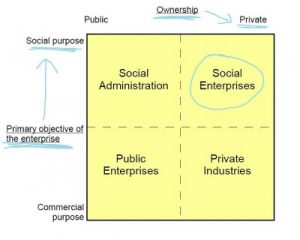A movement has been building for more than 15 years, both in the U.S. and internationally, to establish and recognize in law a type of hybrid private, for-profit entity organized to serve a public or social benefit.
Entities of this type are referred to variously as a “Benefit Corporation,” “B Corp.,” “Social Enterprise,” “Social Business,” emerging “FourthSector” entity, or in the UK, a “Community Interest Corporation (CIC)”.
This movement has recently gained momentum in the U.S. with the passage of legislation in seven states specifically authorizing the creation of a new, separate form of corporate entity called a “Benefit Corporation,” in which a for-profit corporation is permitted to pursue primarily public benefit purposes.
In the U.S. this movement has been restrained by long-established corporate laws and judicial precedent in all fifty states which hold that directors and officers of a for-profit corporation have a fiduciary duty to the shareholders of the entity to maximize shareholder profits. Some U.S. courts have specifically ruled attempts by corporate officers or directors to devote corporate resources to serving society or socially responsible causes as a breach of fiduciary duty when shareholders have sued, alleging that serving such social purposes has reduced shareholder profits. See for example, the eBay vs. Craigslist and Craig Newmark, et. al litigation, decided September 9, 2010, in which a Delaware court wrote: “Directors of a for-profit Delaware corporation cannot deploy a [policy] to defend a business strategy that openly eschews stockholder wealth maximization—at least not consistent with the directors’ fiduciary duties under Delaware law.”
However, recently, the Social Enterprise/ Public Benefit Corporation movement has gained impressive momentum in the U.S., because seven state legislatures have now passed legislation establishing and recognizing “Benefit Corporations” as a separate form of corporate entity, in which for-profit businesses are permitted to exist for public benefit corporate purposes. These states include Maryland (the first state to adopt such legislation, in April, 2010), followed by Vermont, Virginia, New Jersey, New York, Hawaii, and California. The bills passed in New York and California are pending signature by the states’ respective Governors, but the legislation has been signed into law in each of the other states.
In addition, similar legislation is pending in several other states, including North Carolina and Michigan.
For a discussion of the provisions of the New York legislation, which is quite typical of the legislation passed in the other states, see our previous post: New York Becomes Fifth State to Pass Law Authorizing For-Profit Public Benefit Corporations.
History: Father of the Movement
One of the pioneers in this area of establishing for-profit business entities to serve public or social benefit purposes, and perhaps the Father of the Movement to promote this type of entity, was by Nobel Peace Prize laureate Prof. Muhammad Yunus. Prof. Yunus who used the term “Social Business” to describe the for-profit self-sustaining micro-finance Grameen Bank and other businesses he founded to help the poor and serve social needs in Bangladesh, which he said that country’s government lacked the resources to address. As defined by Yunus, a “social business” should seek to generate a modest profit to finance its own operations to address a social need. But, the profit would be used exclusively to expand the company’s reach, improve its product or service, or in other ways subsidize its social mission.
Yunus described his concept for “social business” in his books, Creating a world without poverty – Social Business and the future of capitalism and Building Social Business – The new kind of capitalism that serves humanity’s most pressing needs.
Among the several “social business” enterprises and think tanks that Yunus famously operates are the Grameen Bank, a for-profit micro-finance bank to help the poor in Bangladesh, the Yunus Centre in Bangladesh, a think tank for issues relating to social business, and the Yunus Social Business Centre at the University of Florence.
Internationally
Internationally, the Social Enterprise movement has led to the promulgation of laws establishing for-profit public purpose enterprises in several different countries, as illustrated by a 2008 paper prepared for the FourthSector network by one of its legal interns.
The UK, for example, in 2005 established “Community Interest Corporations (CIC’s)” under its Company’s Act. According to the UK Department of Business Innovation & Skills (BIS), the body charged with regulating these entities, “Community Interest Companies (CICS) are limited companies, with special additional features, created for the use of people who want to conduct a business or other activity for community benefit, and not purely for private advantage.”
“This is achieved by a “community interest test” and “asset lock”, which ensure that the CIC is established for community purposes and the assets and profits are dedicated to these purposes. Registration of a company as a CIC has to be approved by the Regulator who also has a continuing monitoring and enforcement role,” the BIS states.
Ahead of the U.S. in adopting the Social Enterprise concept, the U.K. today has a thriving “Social Enterprise” (CIC) sector. As stated by Social Enterprise UK, the national body that represents the social enterprise sector in the U.K., “The UK is widely regarded to be a world-leader in social enterprise.”
Social Enterprise UK explains the concept succinctly:
In the U.S.
Conceived similarly, as a way to harness the energy of the for-profit sector to serve public or social benefit, the movement has been promoted in the U.S. especially by such organizations as B-Lab in Pennsylvania and New York and the FourthSector network now in North Carolina, as well as a number of other organizations.
Harvard Business School has for a number of years included “Social Enterprise” in its curriculum, and co-sponsors with Harvard’s Kennedy School an annual Social Enterprise Conference.
B-Lab has been at the forefront of the push to pass legislation formally recognizing the “Benefit Corporation” as a distinct legal entity in the fifty states. In fact, New York’s bill and the Benefit Corporation laws passed and signed in each of the other five states so far quite closely resemble model legislation that was drafted by an attorney for B-Lab, working with a Business Associations Committee of the Pennsylvania Bar Association.
The U.S. movement toward establishing a recognized legal form for Benefit Corporations, which would permit officers and directors to prioritize a public or social benefit purpose over maximizing shareholder profit without risk of being sued by shareholders for breach of fiduciary duty, was given special impetus by litigation involving the Ben & Jerry’s Ice Cream business.
As explained in a report by The Times-Herald Record, “Ever since Ben Cohen and Jerry Greenfield famously lost control of their Vermont ice cream business to the Unilever giant, socially conscious business owners have been looking for a way to build a business model that effectively and legally permits a for-profit, corporate dedication to a public benefit, cause or initiative.”
After Unilever acquired a minority shareholding in Ben & Jerry’s, Unilever successfully sued to prevent the founders from pursuing their intended social causes at the alleged expense of maximizing shareholder profit. As directors and officers of a for-profit corporation, Ben & Jerry were legally bound by a fiduciary duty imposed by law, to maximize shareholder profits in priority to any social or public causes they wished to pursue.
Jerry Greenfield, the “Jerry” in Ben & Jerry’s had set an example that inspired the movement, when he said: “We measured our success not just by how much money we made, but by how much we contributed to the community. It was a two-part bottom line.”
Benefit Corporation Movement Gains Momentum in U.S.
Facilitating the movement toward Benefit Corporations, B-Lab has developed criteria and a process for “B Corporation Certification” (see the sample B-Corp Certificate above). The B Corporation Certification is available, on a voluntary basis, to any corporation which establishes to the satisfaction of B-Lab that it has achieved the required “grade” on a report card of certain weighted criteria published by B-Lab as defining a Benefit Corporation. The standards for B Corporation Certification established by B-Lab have generally been accepted by the states passing Benefit Corporation legislation as satisfying the “third-party standard” for general public benefit required under those laws.
According to B Lab, it has so far certified 454 B Corporations, producing combined revenues of $2.18 Billion in 54 different industries, and these companies have realized a combined $1 million in Annual Savings due to special rates and discounts accorded by their suppliers to Certified B Corporations.
A 2011 Annual Report published by B-Lab explains further the benefits and public policy rationale for Benefit Corporations or “B Corporations.”
As referenced above, legislation authorizing the establishment of “Benefit Corporations,” for-profit corporations permitted to pursue public benefit corporate purposes in priority to maximizing shareholder profit, has passed in seven states and been signed into law in five of them: Maryland, Vermont, Virginia, New Jersey, and Hawaii. Similar bills have also been passed by the legislatures in New York and California, and, as of this writing, are awaiting signature by the Governors of those states.
According to B-Lab, at least nine other states now have similar legislation to establish Benefit Corporations pending in their state legislatures, including Colorado, North Carolina, Pennsylvania, Michigan, and others.
More Information
For further information about New York’s legislation, which was passed unanimously by both the New York Senate and Assembly and awaits Governor Cuomo’s signature, see our previous post: New York Becomes Fifth State to Pass Law Authorizing For-Profit Public Benefit Corporations
Information on California’s bill is also linked at the bottom of that post.
For more information on the pending Benefit Corporation legislation and B Corporation Certification, see B-Lab’s website.
For information on the case and rationale for Benefit Corporations, see B-Lab’s 2011 Annual Report.


